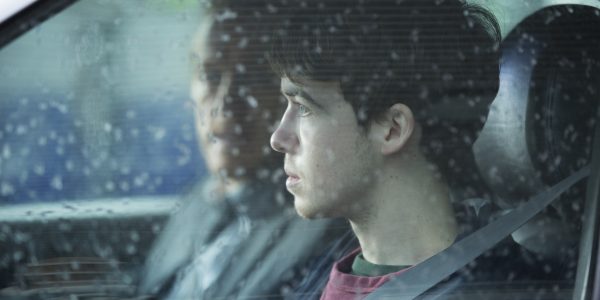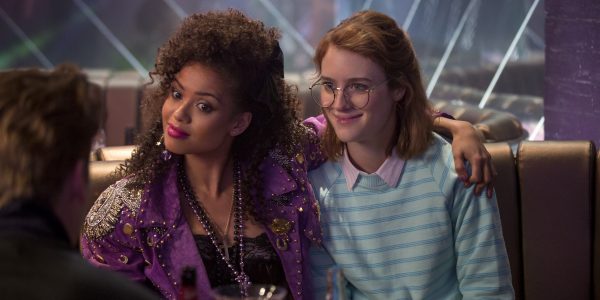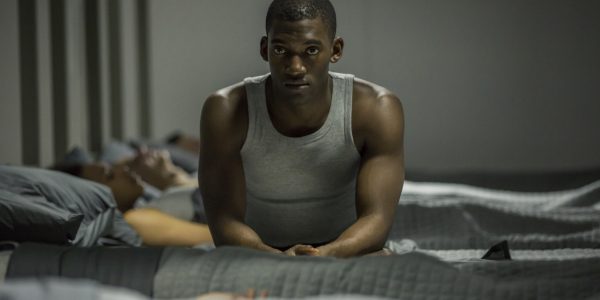Black Mirror Season Three Review
"Some great ideas, but only one true home run"
The first two seasons of the spectacular British series
Black Mirror consist of a grand total of seven episodes (including the Christmas Special starring Jon Hamm). The third season of the series clocks in at 6 episodes, nearly doubling the output of seasons one and two. And, while each episode is a standalone story, tackling so many separate stories might have been a bit too much for Charlie Booker in this go-round. That isn't to say there aren't some really smart and well-executed moments within this third season (and one episode that might just be the best
Black Mirror episode ever produced - I still haven't gotten "Heaven is a Place on Earth" out of my head), but, on the whole, I found myself checking my watch before the end of most of the episodes, wondering why they had such lengthy running times that weren't justified by their stories.
Having covered my major complaint regarding this season of
Black Mirror, I'm going to delve into the land of spoilers and break down what worked in each individual episode, and where things went off the rails. And be warned: There will also be spoilers for episodes that aired in seasons one and two, so proceed with caution if you haven't managed to catch those episodes yet.

"Nosedive"
The second best episode of this third season builds on, of all things, an episode of
Community (the creation of
Meow Meow Beenz essentially created this same set-up, only on a much smaller scale). Considering I'm writing this review from my hotel room in Peru, and my friend just squealed when she saw how many people liked a Facebook picture she just put up, "Nosedive" is eerily accurate in it's look at a future controlled by our online social media presence. Sanitized by the desperate need for "likes" to improve one's social status, it's all too easy to understand why Bryce Dallas Howard's Lacie is so focused on gaining traction to get her dream apartment, and, as a result, her dream life. Howard is perfectly cast, and it's incredibly easy to empathize with her desire to reach her goal, even as we, like Lacie's brother, recognize how completely shallow her actions are. Likewise, Cherry Jones nails her role as the truck driver who gives Lacie the confidence to strip away the outer trappings of the conventions of this new societal pressure for happiness above all sense of free will or honesty.
The problem with the episode lies in its initial half. Once the episode established Lacie's goal and how society operates in this world, we didn't need to spend a full 30 minutes exploring the same interactions over and over again. The meat of the piece was always going to be watching Lacie's spiral downward (the "Nosedive" of the title), so why not establish the character, the set of circumstances, and commence with the downward fall? It would have made for a much tighter episode (a comment you will hear from me several more times over the course of this review, so get ready). Shaving as little as five or ten minutes from the running time would have made this episode much more successful in accomplishing what it wanted to do: warn us that putting so much emphasis on our social media lives can spiral into something far more sinister than craving likes on Facebook.

"Playtest"
While I can appreciate the concept of the episode, and how Wyatt Russell's Cooper played around with the various horror film conventions to great success while in the simulation, this episode just didn't work for me. A lot of that has to do with the show's multiple endings, which, while trippy, cheapened the overall message of the episode: running away from your problems isn't the best solution, no matter how stressful they may be. Knowing that what Cooper experienced within the virtual reality simulation was not real- on any level, as he had died prior- felt cheap in the grand scheme of things. While it was clear that the phone interference was going to have some effect on the arc of the episode, the "twist" ending was fairly predictable. Not the best effort from the season, but certainly not the worst episode of the bunch.

"Shut Up and Dance"
The most polarizing episode of the third season has an awful lot in common with the most polarizing episode of
Black Mirror's first two seasons, "White Bear," in that we spend an entire episode empathizing with a character who is seemingly under attack by a terrifyingly mysterious force before having all of our expectations flipped at the last minute. Personally, I didn't enjoy "White Bear" largely for that reason, although I had other issues with that particular episode. As for "Shut Up and Dance," I appreciated the central performances from Alex Lawther and Jerome Flynn, but the episode was far too long, and the twist at the end didn't feel at all earned.
That Kenny was looking at child porn, rather than simply being caught watching regular porn, makes sense in terms of how far he is willing to go to make it all go away. But keeping that twist until the end of an overly long episode meant that we were asked to spend an episode pondering why Kenny is going to these lengths for a video that might not actually ruin his life. When the truth is revealed, and Kenny is asked to fight to the death, the episode goes from dark to just strange. Watching the episode, as with "White Bear," the major take away seems to be that those who have done horrific things are still human. Which is a difficult lesson, but one that we didn't necessarily need to be reiterated for a second time on the series where there are so many other stories out there to be told.

"San Junipero"
I'm going to just come right out and say it: "San Junipero" is the best episode
Black Mirror has ever done. Full stop. It's smart, savvy, tells a full story in the course of an hour and never drags once, and it has, as perhaps the biggest shock, as close to a happy ending as an episode of
Black Mirror can have. I could easily write 1,000 words just on this episode, but I'll just focus on two of the major highlights of the episode: the expert casting of Gugu Mbatha-Raw and Mackenzie Davis, and the beautiful message within the story.
Mbatha-Raw and Davis are two of the best younger actresses currently working today (Davis has been killing it on the criminally under watched AMC series
Halt and Catch Fire, which just ended its best season yet a few weeks ago). In the span of only an hour, the pair created two complex and layered characters who jump off the screen. While the episode is intricately plotted to make us assume that not everything it right in the world of San Junipero, it is the work of Mbatha-Raw and Davis that sells the twist and keeps us invested in how this beautiful love story will turn out.
And it is, in fact, a beautiful love story. When so much ink has been spilled talking about the Bury Your Gays trope this past year, I'm truly happy to be talking about an episode that offers us a lovely twist on that particular trope. Yes, both Yorkie and Kelly end up dead by episode's close, but they end up together. And while there are still hints that they might not spend eternity as happy as they are right now (perhaps they will grow apart, or perhaps they will dissolve into the empty shells that Kelly mentions early in the episode), for that moment, all is right in their world- artificial though it may be. For something as uncertain as death, it's nice to imagine an afterlife like the one in San Junipero.

"Men Against Fire"
As an anti-war statement, "Men Against Fire" works well. As a well-paced narrative, the episode needs some work. As was a theme throughout the third season of
Black Mirror, "Men Against Fire" ran too long and lacked the right pacing to make it a fully effective episode. Ideally, the episode would have wrapped immediately following Stripe's realization that his enemy was actually just as human as he was, although the longer running time does allow for an excellent speech from the always good Michael Kelly. Continuing the story past the reveal of what exactly the Roaches are just serves to muddy the action and drag the pace of the episode down with it. Pinpointing the right moment to halt a story isn't necessarily the easiest thing to do, especially when the story is trying to impart a grand lesson, as is the case in "Men Against Fire." But it's something that Charlie Booker and company need to employ in future seasons of
Black Mirror, if they want the episodes to hit on all cylinders.

"Hated in the Nation"
The central conceit of "Hated in the Nation" is excellent: using social media hashtags as a means to kill someone the entire nation hates, only to have that same device turned on all those who participated- even unknowingly- in the blood sport. It's scary, resonates with our current technological uses, and has a great message about online bullying (something that is all too common in the anonymity of Twitter). But, as with most of the episodes this season, it just goes on for a bit too long.
I was intrigued throughout the main action of the episode. The cast was excellent, and the story was well-paced. That is, until the ending. Having Blue fake her death and head out in search of Garrett Scholes just struck me as ridiculous in light of the episode as a whole. Sure, I can understand why Blue and Prake would want to catch the man responsible for all of this death, but it doesn't fit the characters we've spent the past hour with. To have them orchestrate something as complex as this? I can't see them doing it. And that is where the episode falls apart.
Pros
- San Junipero was a series high point
- All-around great casting
Cons
- Many episodes ran longer than the story required
- Shut Up and Dance was too close to White Bear
 "Nosedive"
The second best episode of this third season builds on, of all things, an episode of Community (the creation of Meow Meow Beenz essentially created this same set-up, only on a much smaller scale). Considering I'm writing this review from my hotel room in Peru, and my friend just squealed when she saw how many people liked a Facebook picture she just put up, "Nosedive" is eerily accurate in it's look at a future controlled by our online social media presence. Sanitized by the desperate need for "likes" to improve one's social status, it's all too easy to understand why Bryce Dallas Howard's Lacie is so focused on gaining traction to get her dream apartment, and, as a result, her dream life. Howard is perfectly cast, and it's incredibly easy to empathize with her desire to reach her goal, even as we, like Lacie's brother, recognize how completely shallow her actions are. Likewise, Cherry Jones nails her role as the truck driver who gives Lacie the confidence to strip away the outer trappings of the conventions of this new societal pressure for happiness above all sense of free will or honesty.
The problem with the episode lies in its initial half. Once the episode established Lacie's goal and how society operates in this world, we didn't need to spend a full 30 minutes exploring the same interactions over and over again. The meat of the piece was always going to be watching Lacie's spiral downward (the "Nosedive" of the title), so why not establish the character, the set of circumstances, and commence with the downward fall? It would have made for a much tighter episode (a comment you will hear from me several more times over the course of this review, so get ready). Shaving as little as five or ten minutes from the running time would have made this episode much more successful in accomplishing what it wanted to do: warn us that putting so much emphasis on our social media lives can spiral into something far more sinister than craving likes on Facebook.
"Nosedive"
The second best episode of this third season builds on, of all things, an episode of Community (the creation of Meow Meow Beenz essentially created this same set-up, only on a much smaller scale). Considering I'm writing this review from my hotel room in Peru, and my friend just squealed when she saw how many people liked a Facebook picture she just put up, "Nosedive" is eerily accurate in it's look at a future controlled by our online social media presence. Sanitized by the desperate need for "likes" to improve one's social status, it's all too easy to understand why Bryce Dallas Howard's Lacie is so focused on gaining traction to get her dream apartment, and, as a result, her dream life. Howard is perfectly cast, and it's incredibly easy to empathize with her desire to reach her goal, even as we, like Lacie's brother, recognize how completely shallow her actions are. Likewise, Cherry Jones nails her role as the truck driver who gives Lacie the confidence to strip away the outer trappings of the conventions of this new societal pressure for happiness above all sense of free will or honesty.
The problem with the episode lies in its initial half. Once the episode established Lacie's goal and how society operates in this world, we didn't need to spend a full 30 minutes exploring the same interactions over and over again. The meat of the piece was always going to be watching Lacie's spiral downward (the "Nosedive" of the title), so why not establish the character, the set of circumstances, and commence with the downward fall? It would have made for a much tighter episode (a comment you will hear from me several more times over the course of this review, so get ready). Shaving as little as five or ten minutes from the running time would have made this episode much more successful in accomplishing what it wanted to do: warn us that putting so much emphasis on our social media lives can spiral into something far more sinister than craving likes on Facebook.
 "Playtest"
While I can appreciate the concept of the episode, and how Wyatt Russell's Cooper played around with the various horror film conventions to great success while in the simulation, this episode just didn't work for me. A lot of that has to do with the show's multiple endings, which, while trippy, cheapened the overall message of the episode: running away from your problems isn't the best solution, no matter how stressful they may be. Knowing that what Cooper experienced within the virtual reality simulation was not real- on any level, as he had died prior- felt cheap in the grand scheme of things. While it was clear that the phone interference was going to have some effect on the arc of the episode, the "twist" ending was fairly predictable. Not the best effort from the season, but certainly not the worst episode of the bunch.
"Playtest"
While I can appreciate the concept of the episode, and how Wyatt Russell's Cooper played around with the various horror film conventions to great success while in the simulation, this episode just didn't work for me. A lot of that has to do with the show's multiple endings, which, while trippy, cheapened the overall message of the episode: running away from your problems isn't the best solution, no matter how stressful they may be. Knowing that what Cooper experienced within the virtual reality simulation was not real- on any level, as he had died prior- felt cheap in the grand scheme of things. While it was clear that the phone interference was going to have some effect on the arc of the episode, the "twist" ending was fairly predictable. Not the best effort from the season, but certainly not the worst episode of the bunch.
 "Shut Up and Dance"
The most polarizing episode of the third season has an awful lot in common with the most polarizing episode of Black Mirror's first two seasons, "White Bear," in that we spend an entire episode empathizing with a character who is seemingly under attack by a terrifyingly mysterious force before having all of our expectations flipped at the last minute. Personally, I didn't enjoy "White Bear" largely for that reason, although I had other issues with that particular episode. As for "Shut Up and Dance," I appreciated the central performances from Alex Lawther and Jerome Flynn, but the episode was far too long, and the twist at the end didn't feel at all earned.
That Kenny was looking at child porn, rather than simply being caught watching regular porn, makes sense in terms of how far he is willing to go to make it all go away. But keeping that twist until the end of an overly long episode meant that we were asked to spend an episode pondering why Kenny is going to these lengths for a video that might not actually ruin his life. When the truth is revealed, and Kenny is asked to fight to the death, the episode goes from dark to just strange. Watching the episode, as with "White Bear," the major take away seems to be that those who have done horrific things are still human. Which is a difficult lesson, but one that we didn't necessarily need to be reiterated for a second time on the series where there are so many other stories out there to be told.
"Shut Up and Dance"
The most polarizing episode of the third season has an awful lot in common with the most polarizing episode of Black Mirror's first two seasons, "White Bear," in that we spend an entire episode empathizing with a character who is seemingly under attack by a terrifyingly mysterious force before having all of our expectations flipped at the last minute. Personally, I didn't enjoy "White Bear" largely for that reason, although I had other issues with that particular episode. As for "Shut Up and Dance," I appreciated the central performances from Alex Lawther and Jerome Flynn, but the episode was far too long, and the twist at the end didn't feel at all earned.
That Kenny was looking at child porn, rather than simply being caught watching regular porn, makes sense in terms of how far he is willing to go to make it all go away. But keeping that twist until the end of an overly long episode meant that we were asked to spend an episode pondering why Kenny is going to these lengths for a video that might not actually ruin his life. When the truth is revealed, and Kenny is asked to fight to the death, the episode goes from dark to just strange. Watching the episode, as with "White Bear," the major take away seems to be that those who have done horrific things are still human. Which is a difficult lesson, but one that we didn't necessarily need to be reiterated for a second time on the series where there are so many other stories out there to be told.
 "San Junipero"
I'm going to just come right out and say it: "San Junipero" is the best episode Black Mirror has ever done. Full stop. It's smart, savvy, tells a full story in the course of an hour and never drags once, and it has, as perhaps the biggest shock, as close to a happy ending as an episode of Black Mirror can have. I could easily write 1,000 words just on this episode, but I'll just focus on two of the major highlights of the episode: the expert casting of Gugu Mbatha-Raw and Mackenzie Davis, and the beautiful message within the story.
Mbatha-Raw and Davis are two of the best younger actresses currently working today (Davis has been killing it on the criminally under watched AMC series Halt and Catch Fire, which just ended its best season yet a few weeks ago). In the span of only an hour, the pair created two complex and layered characters who jump off the screen. While the episode is intricately plotted to make us assume that not everything it right in the world of San Junipero, it is the work of Mbatha-Raw and Davis that sells the twist and keeps us invested in how this beautiful love story will turn out.
And it is, in fact, a beautiful love story. When so much ink has been spilled talking about the Bury Your Gays trope this past year, I'm truly happy to be talking about an episode that offers us a lovely twist on that particular trope. Yes, both Yorkie and Kelly end up dead by episode's close, but they end up together. And while there are still hints that they might not spend eternity as happy as they are right now (perhaps they will grow apart, or perhaps they will dissolve into the empty shells that Kelly mentions early in the episode), for that moment, all is right in their world- artificial though it may be. For something as uncertain as death, it's nice to imagine an afterlife like the one in San Junipero.
"San Junipero"
I'm going to just come right out and say it: "San Junipero" is the best episode Black Mirror has ever done. Full stop. It's smart, savvy, tells a full story in the course of an hour and never drags once, and it has, as perhaps the biggest shock, as close to a happy ending as an episode of Black Mirror can have. I could easily write 1,000 words just on this episode, but I'll just focus on two of the major highlights of the episode: the expert casting of Gugu Mbatha-Raw and Mackenzie Davis, and the beautiful message within the story.
Mbatha-Raw and Davis are two of the best younger actresses currently working today (Davis has been killing it on the criminally under watched AMC series Halt and Catch Fire, which just ended its best season yet a few weeks ago). In the span of only an hour, the pair created two complex and layered characters who jump off the screen. While the episode is intricately plotted to make us assume that not everything it right in the world of San Junipero, it is the work of Mbatha-Raw and Davis that sells the twist and keeps us invested in how this beautiful love story will turn out.
And it is, in fact, a beautiful love story. When so much ink has been spilled talking about the Bury Your Gays trope this past year, I'm truly happy to be talking about an episode that offers us a lovely twist on that particular trope. Yes, both Yorkie and Kelly end up dead by episode's close, but they end up together. And while there are still hints that they might not spend eternity as happy as they are right now (perhaps they will grow apart, or perhaps they will dissolve into the empty shells that Kelly mentions early in the episode), for that moment, all is right in their world- artificial though it may be. For something as uncertain as death, it's nice to imagine an afterlife like the one in San Junipero.
 "Men Against Fire"
As an anti-war statement, "Men Against Fire" works well. As a well-paced narrative, the episode needs some work. As was a theme throughout the third season of Black Mirror, "Men Against Fire" ran too long and lacked the right pacing to make it a fully effective episode. Ideally, the episode would have wrapped immediately following Stripe's realization that his enemy was actually just as human as he was, although the longer running time does allow for an excellent speech from the always good Michael Kelly. Continuing the story past the reveal of what exactly the Roaches are just serves to muddy the action and drag the pace of the episode down with it. Pinpointing the right moment to halt a story isn't necessarily the easiest thing to do, especially when the story is trying to impart a grand lesson, as is the case in "Men Against Fire." But it's something that Charlie Booker and company need to employ in future seasons of Black Mirror, if they want the episodes to hit on all cylinders.
"Men Against Fire"
As an anti-war statement, "Men Against Fire" works well. As a well-paced narrative, the episode needs some work. As was a theme throughout the third season of Black Mirror, "Men Against Fire" ran too long and lacked the right pacing to make it a fully effective episode. Ideally, the episode would have wrapped immediately following Stripe's realization that his enemy was actually just as human as he was, although the longer running time does allow for an excellent speech from the always good Michael Kelly. Continuing the story past the reveal of what exactly the Roaches are just serves to muddy the action and drag the pace of the episode down with it. Pinpointing the right moment to halt a story isn't necessarily the easiest thing to do, especially when the story is trying to impart a grand lesson, as is the case in "Men Against Fire." But it's something that Charlie Booker and company need to employ in future seasons of Black Mirror, if they want the episodes to hit on all cylinders.
 "Hated in the Nation"
The central conceit of "Hated in the Nation" is excellent: using social media hashtags as a means to kill someone the entire nation hates, only to have that same device turned on all those who participated- even unknowingly- in the blood sport. It's scary, resonates with our current technological uses, and has a great message about online bullying (something that is all too common in the anonymity of Twitter). But, as with most of the episodes this season, it just goes on for a bit too long.
I was intrigued throughout the main action of the episode. The cast was excellent, and the story was well-paced. That is, until the ending. Having Blue fake her death and head out in search of Garrett Scholes just struck me as ridiculous in light of the episode as a whole. Sure, I can understand why Blue and Prake would want to catch the man responsible for all of this death, but it doesn't fit the characters we've spent the past hour with. To have them orchestrate something as complex as this? I can't see them doing it. And that is where the episode falls apart.
"Hated in the Nation"
The central conceit of "Hated in the Nation" is excellent: using social media hashtags as a means to kill someone the entire nation hates, only to have that same device turned on all those who participated- even unknowingly- in the blood sport. It's scary, resonates with our current technological uses, and has a great message about online bullying (something that is all too common in the anonymity of Twitter). But, as with most of the episodes this season, it just goes on for a bit too long.
I was intrigued throughout the main action of the episode. The cast was excellent, and the story was well-paced. That is, until the ending. Having Blue fake her death and head out in search of Garrett Scholes just struck me as ridiculous in light of the episode as a whole. Sure, I can understand why Blue and Prake would want to catch the man responsible for all of this death, but it doesn't fit the characters we've spent the past hour with. To have them orchestrate something as complex as this? I can't see them doing it. And that is where the episode falls apart.